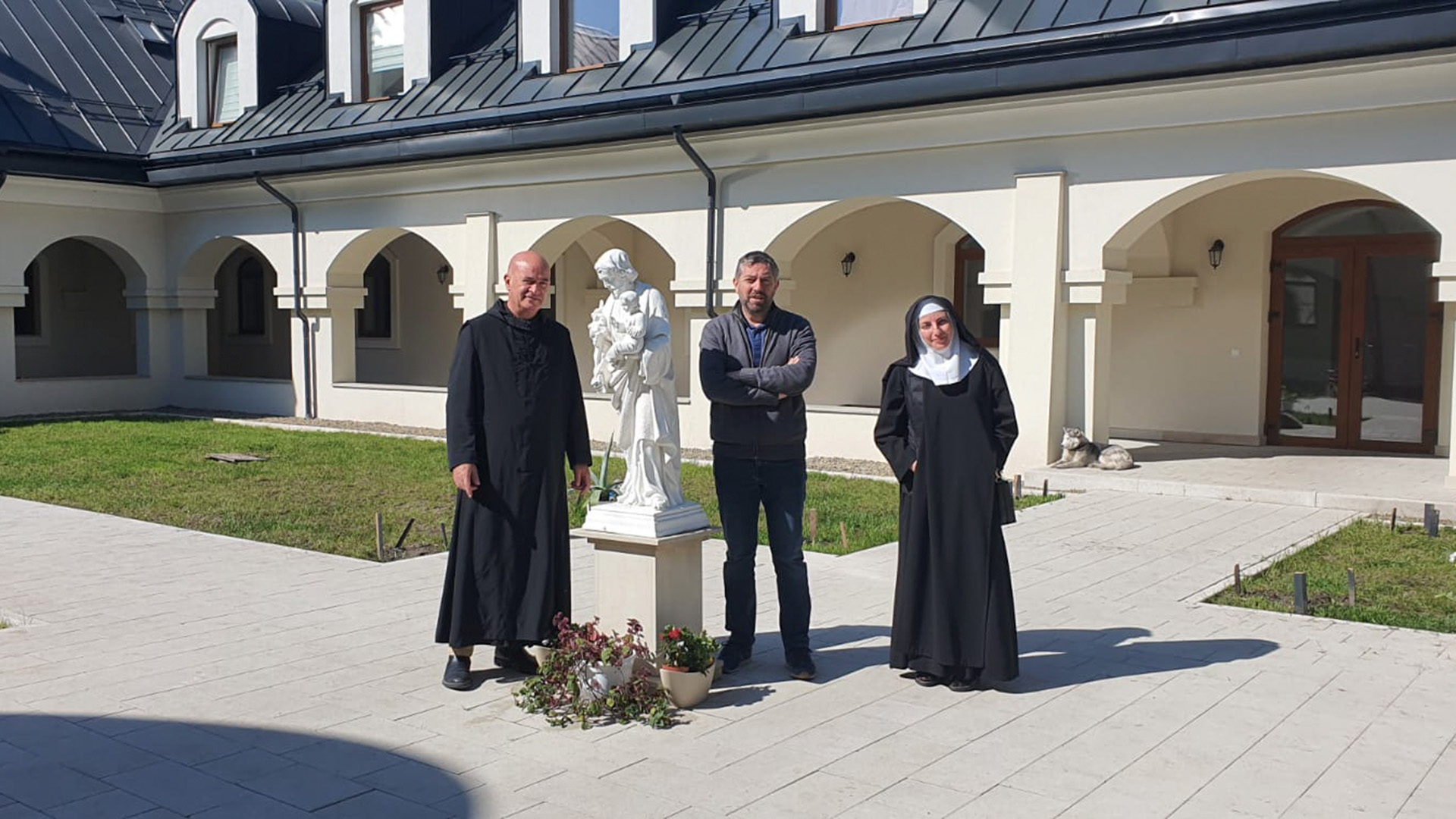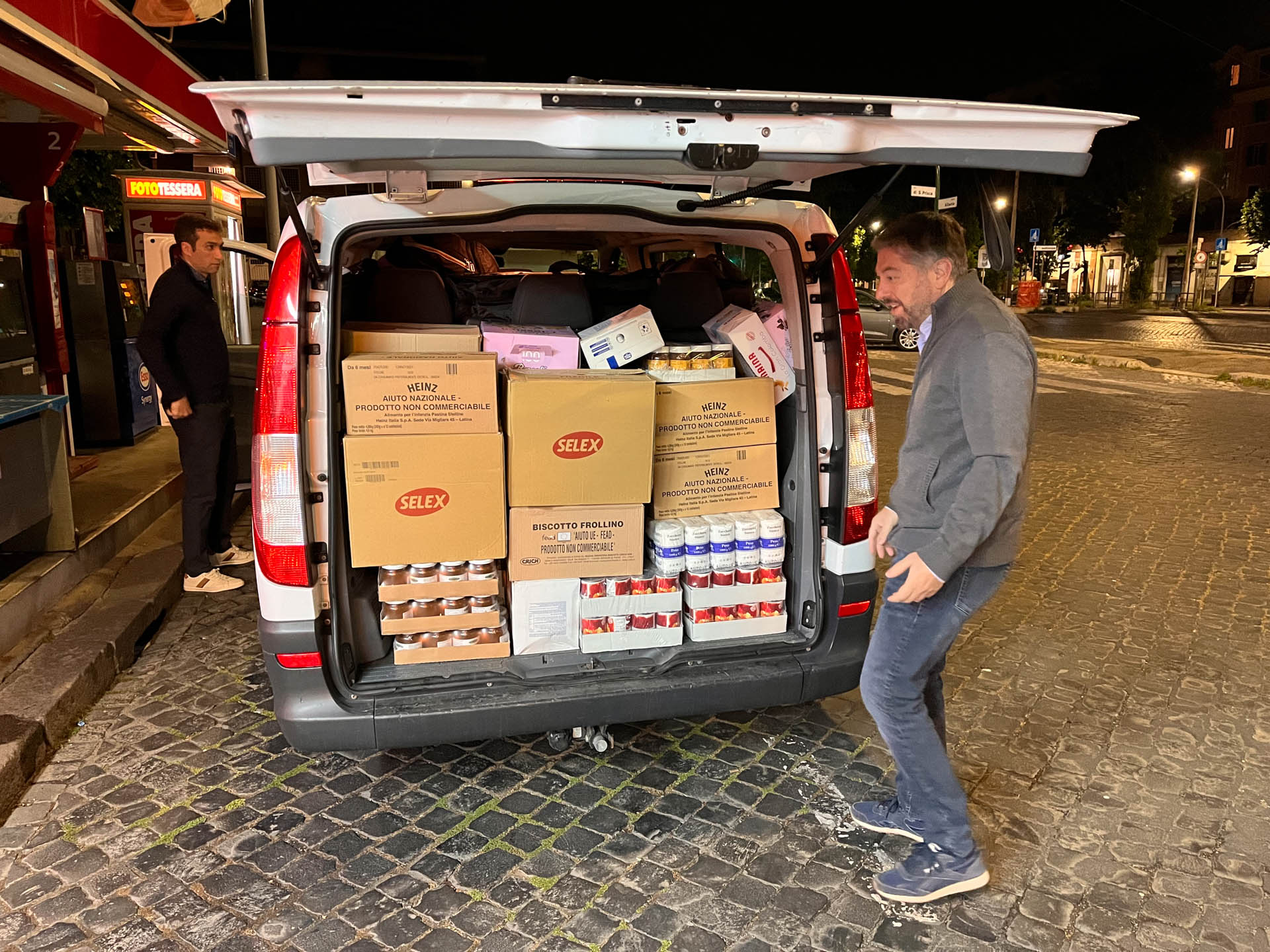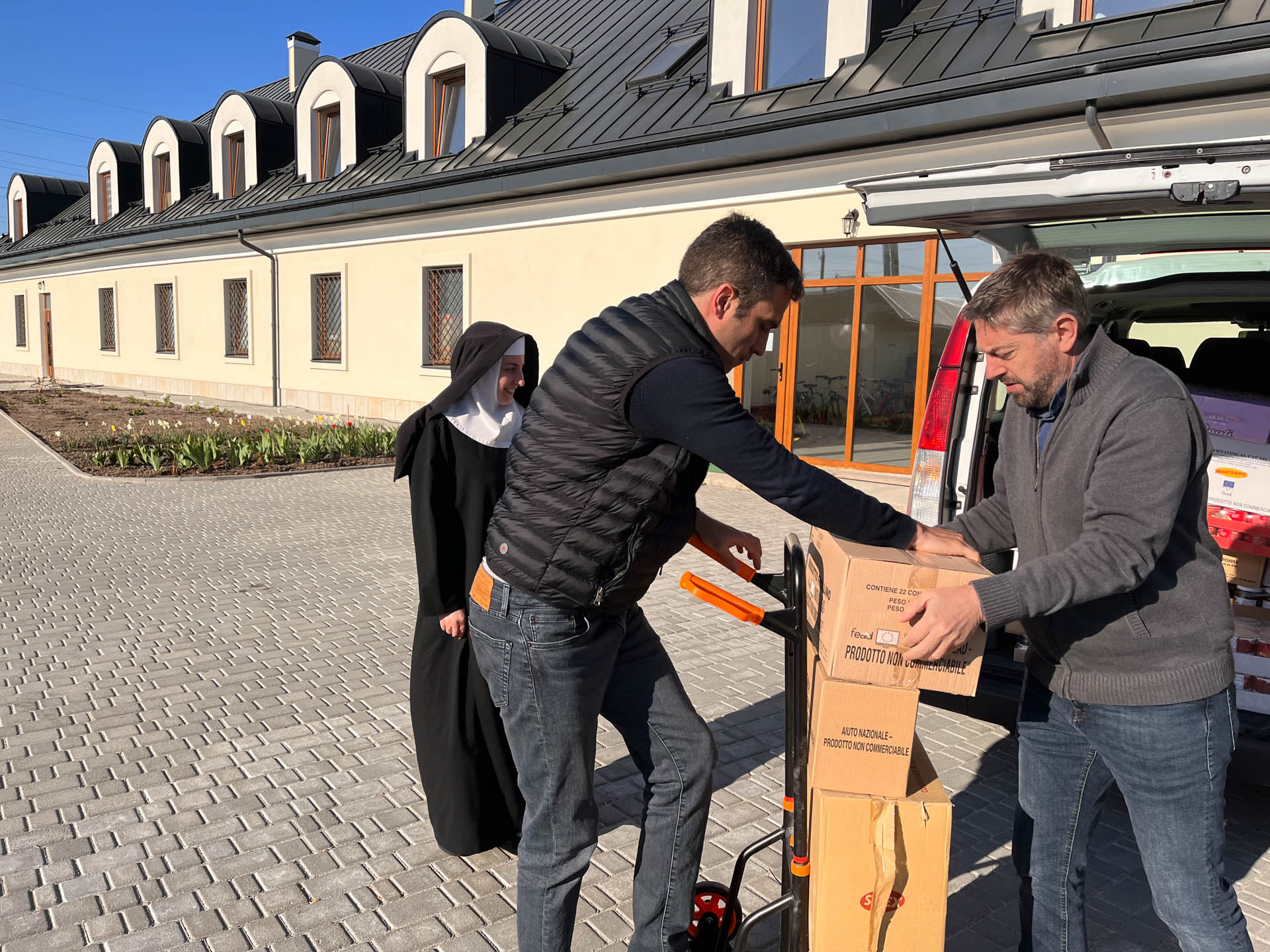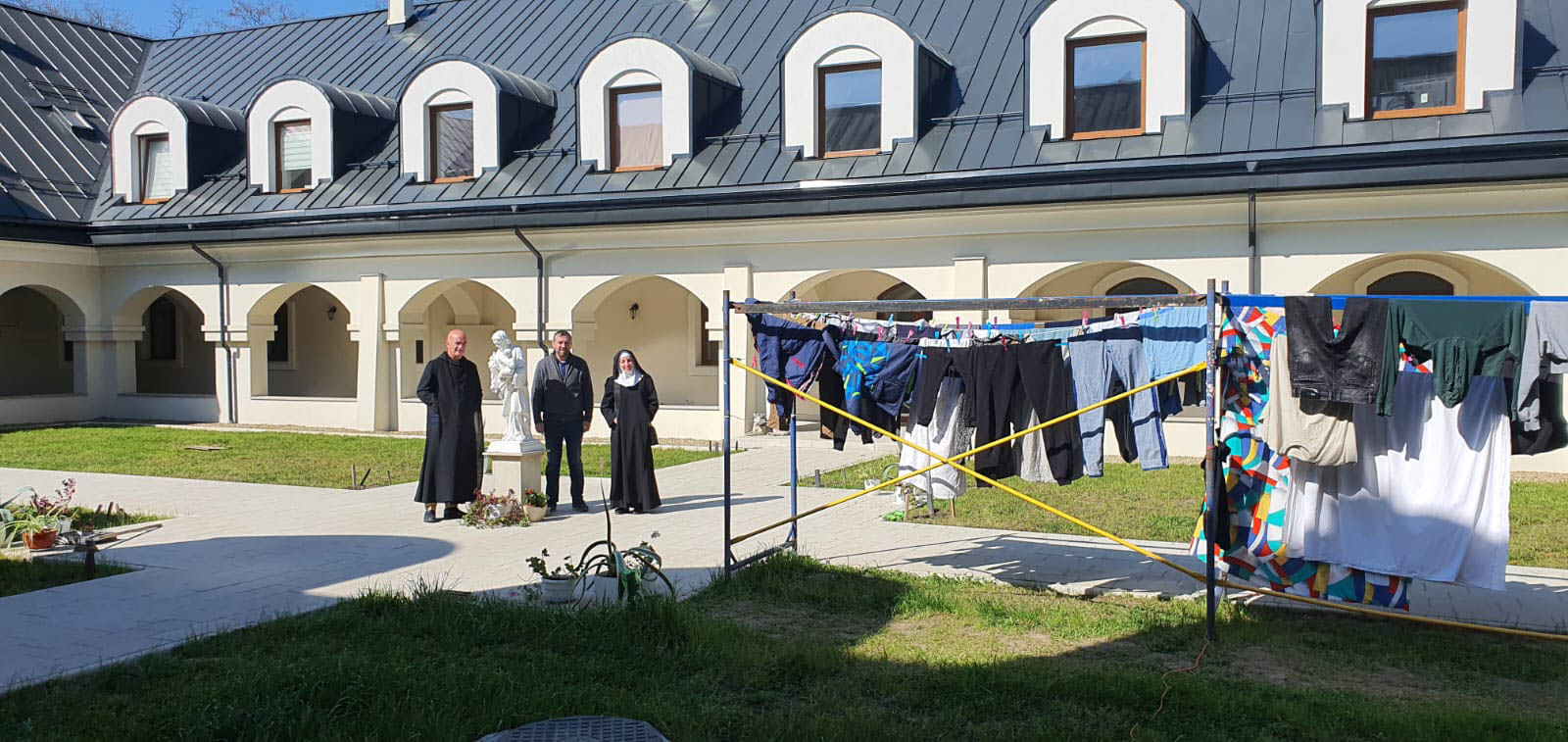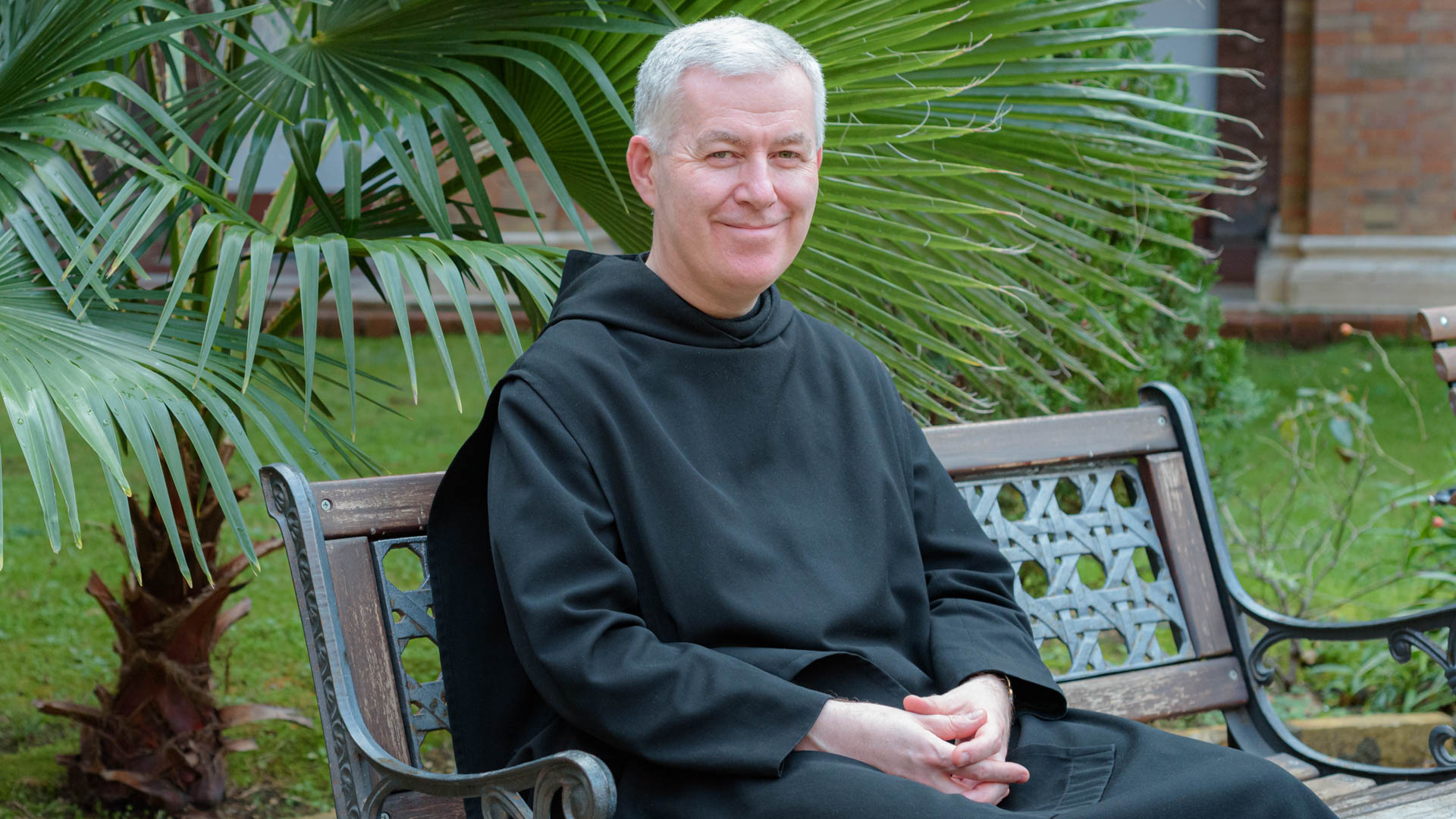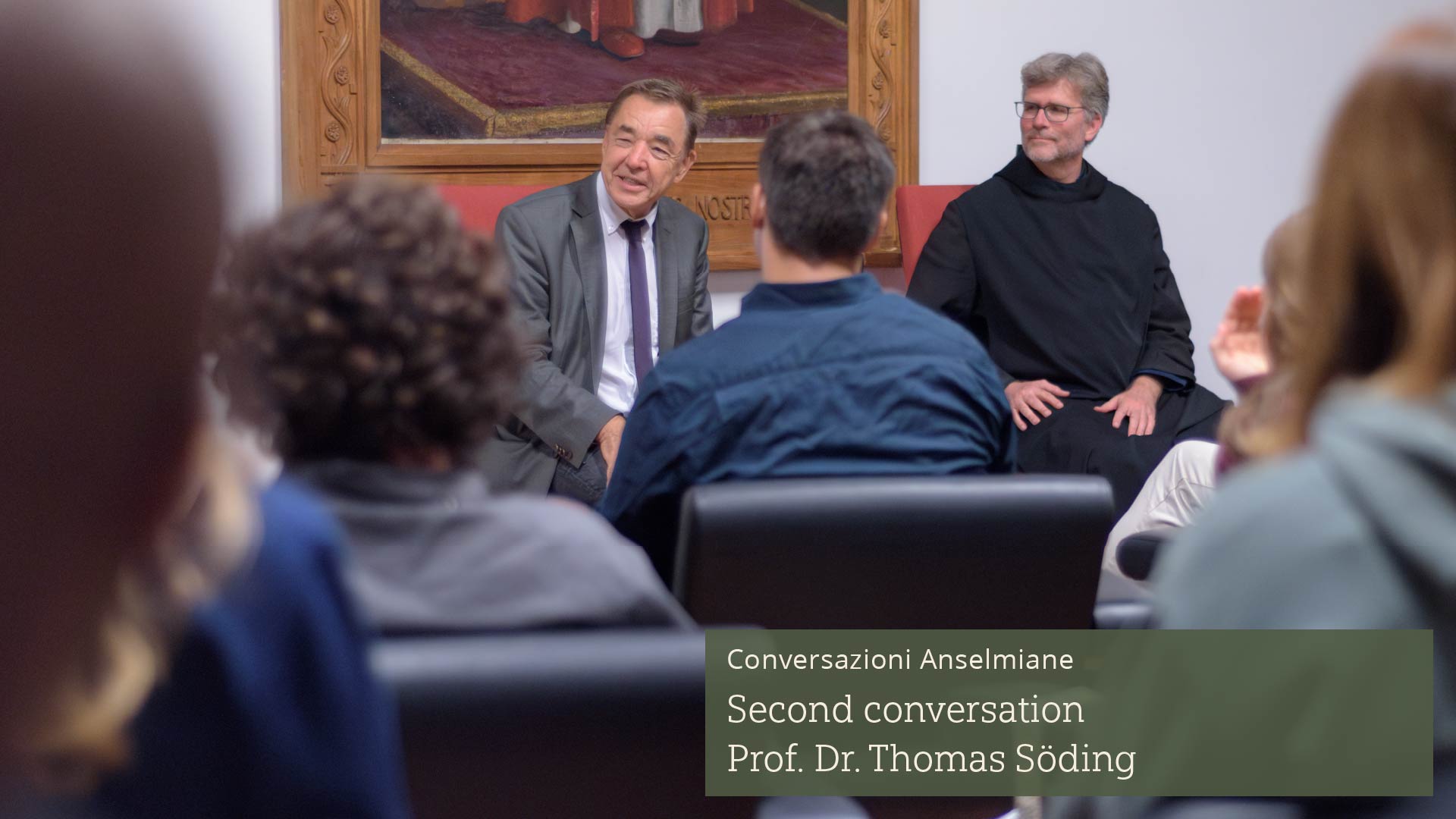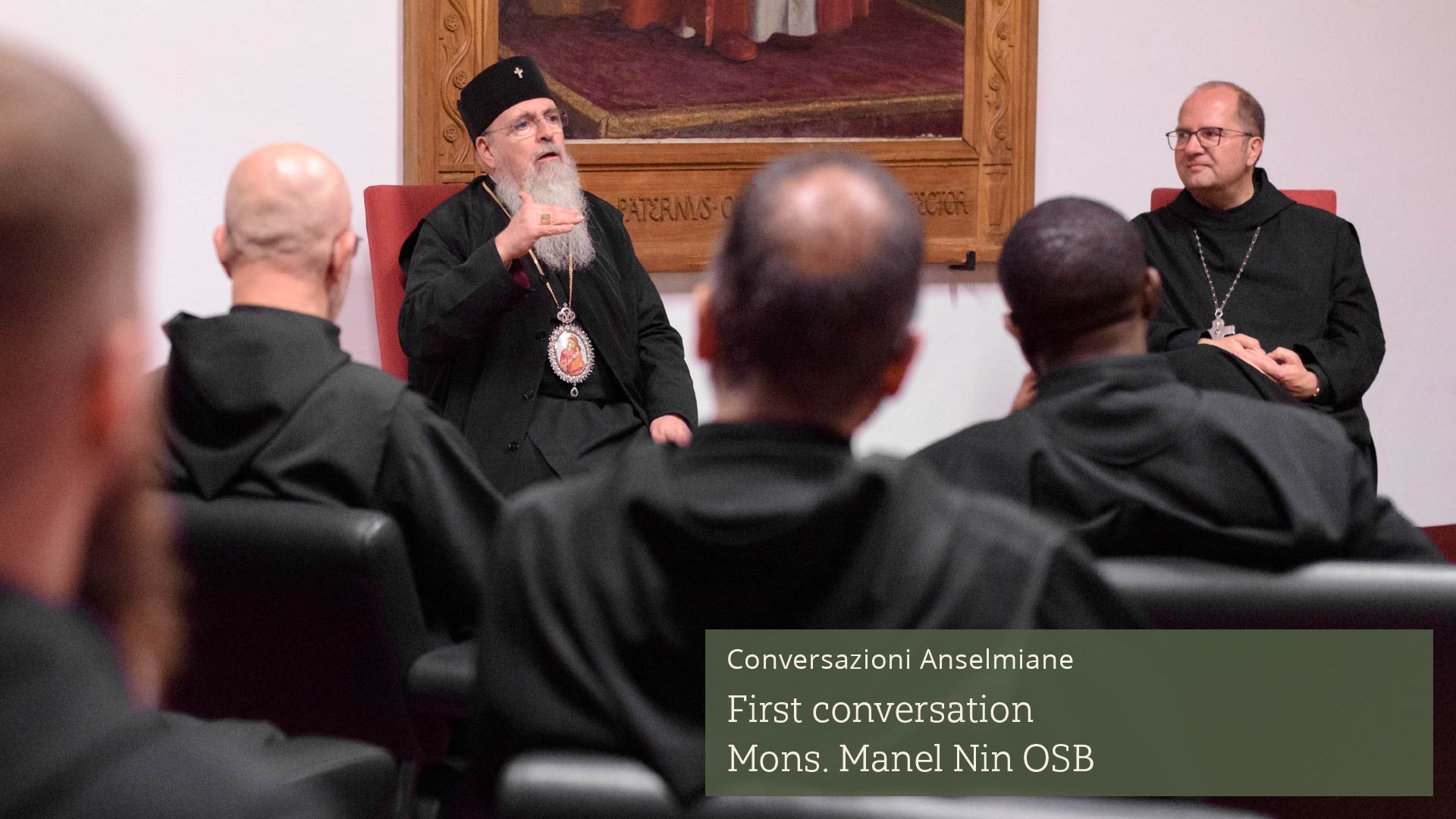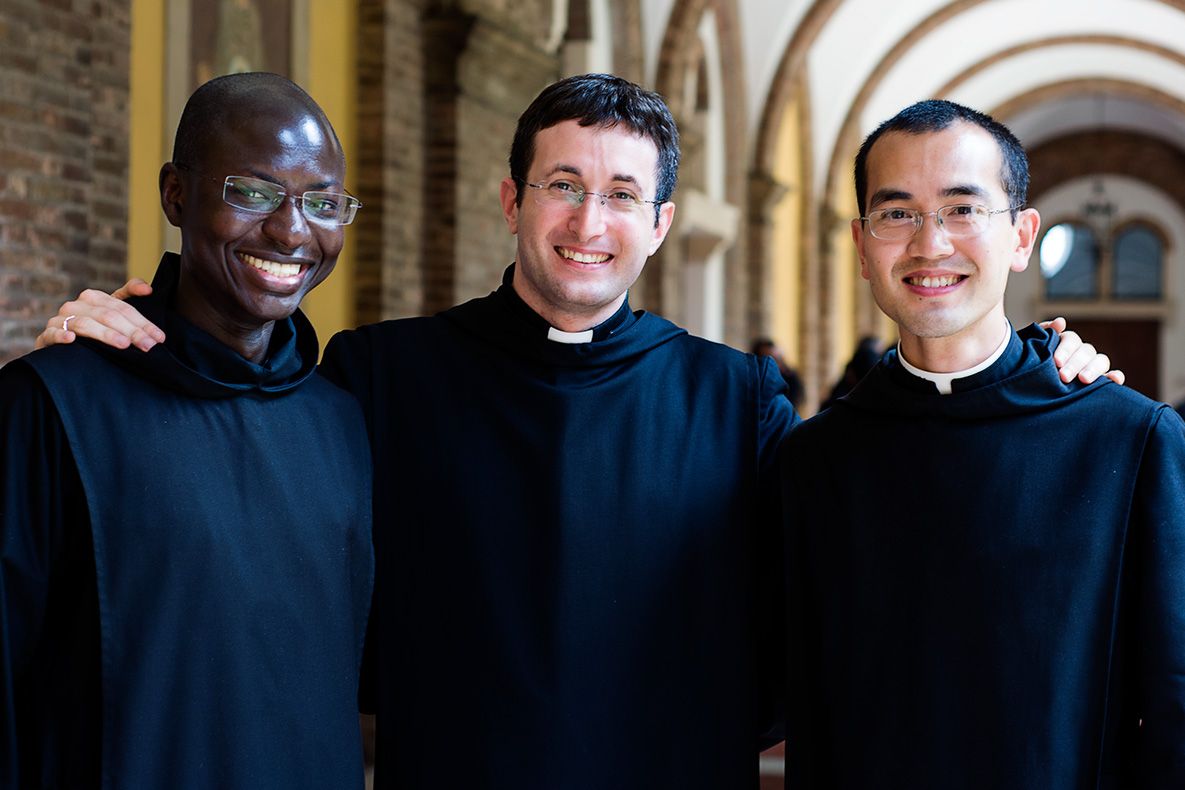20 May 2022
Sant’Anselmo Collegio and Athenaeum demonstrated our solidarity with the suffering people in Ukraine by collecting funds in April. However, having had a Ukraine Benedictine nun as our student until December 2021, Sr. Maria Kukharyk OSB, we heard of the needs of their community and decided to start a mission. Fr. Benoit Alloggia OSB, guestmaster and nurse of our Abbey, went on a 2.500 km trip together with his friends. Here are some impressions of their visit to Ukraine.
Tuesday, 3 May – Sunday, 8 May 2022
At 4 a.m. on Tuesday morning, 3 May, from Sant’Anselmo, Alexandre Etaix, student of the Faculty of Theology at the Pontifical Athenaeum Sant’Anselmo, Antonio Aurelio, Trinitarian priest from Spain, living in Rome, and I started our journey to the city of Lviv in Ukraine. We were bringing a minivan loaded with food, medicine, blankets and some monetary donations to the Benedictine abbey of Saint Joseph in Lviv, Ukraine.
The monetary donations we delivered were mainly from the Rotary club of Murrysville, Pennsylvania, USA and some other friends from the USA. The food and medicine was provided by the Trinitarian community and Sant’Anselmo.
After passing through the regions of Venice and Trieste in Italy, we entered Slovenia in the late morning and reached Hungary by the afternoon.
We arrived at the edge of the Balaton lake, the “sea of the Hungarians” located in the center of the country, at the end of the afternoon, around 5 p.m. As the sun started to go down, we waited for the arrival of the ferry to cross the lake. It was a very beautiful landscape, calm and bright.
After a 10-minute crossing, we arrived on the peninsula of Tihany. At the top of the hill overlooking the lake and offering an amazing view, sat the Benedictine Abbey of St. Aignan, where we spent the night.
Our former student, Br. Andràs, welcomed us. During the meal, we met Fr. Mihályi Jeromos, the young prior of the community of about a dozen brothers, of whom we saw only two. Prior Mihályi gave us the contact information for the Hungarian Caritas community located at our border crossing.
The next morning, we left at about 7 a.m. During the morning, we crossed the rest of Hungary after enduring some traffic jams on the main bypass of Budapest, which are always caused by truck accidents. A few kilometers before the border, the highway ends and is reduced to a country road. We refueled in one of the last small towns in Hungary, Vamosatya, before reaching Barabàs, the last village before the border.
We arrived there around noon. Vadasz Balint, an employee of the Hungarian Caritas, was waiting for us. Originally from Budapest, he was sent there by the Hungarian Caritas at the beginning of the conflict.
He is in charge of a Caritas post in this tiny village in the Hungarian countryside with a predominantly Roma population. The office is small but has been very busy since the beginning of the war. Many Ukrainians come to this side of the border to collect food. He offered us a meal that he explained was paid for by the Hungarian government, which has supported the work of Caritas since the beginning of the war and has put the grounds of the municipal school at its disposal.
Soon a Ukrainian lady arrived. She helped us fill in documents of food declarations in preparation for the border crossing. She explained that she herself would cross the border with us and some other colleagues. The resulting convoy of four cars made the crossing easier for us.
We purposefully chose this border crossing because of its small size. Indeed, after only two hours of waiting and paperwork, we passed to the other side. The customs officers took a lot of time but did not pose any particular problem.
The 30 kilometers after crossing the border were the slowest of the trip. It is at the end of Ukraine, a poor and remote land, flat and desolate, where the roads are literally broken by the winter frost and not maintained. We passed by a few horse-drawn carts and crossed several villages while moving at a walking pace.
We then joined a slightly better road that led us to Mukachevo, where we found a national road that, after 200 kilometers, took us to Lviv, our final destination.
The road was frequented by many vehicles, even though, for the week before, the difficulties of gasoline supplies had been felt in the whole country. The Russians have bombed a lot of the Ukraine infrastructure, as well as civilians, and they continued to do so as we traveled. The night before, they had sent four or five more missiles to bomb the power plants of Lviv, where we were going. On the road we were taking, only one station out of six or seven was open and at those, the lines of trucks and cars were getting longer and longer, waiting to fill up.
We crossed the entire Carpathian Mountains, a beautiful mountainous region of winding roads and wooden houses. Throughout this drive we crossed borders with Slovakia and then Poland: The two countries, and thus the European Union, are about 50 km apart, more or less. In the gardens and the fields, the inhabitants had improvised plots of land where they plant leeks and potatoes, in anticipation of difficult weather.
At the end of the afternoon, we descended from the mountains and then the highway of the plain led us to the suburbs of Lviv. Luckily, the monastery where we were going was located south of the city, so we didn’t have to go through the city itself.
We arrived Wednesday evening at the Benedictine abbey of Saint Joseph. This monastery was founded a year ago by Lublin Abbey in Zabytek, Poland. They belong to the Benedictine congregation of the Annunciation.
With the beginning of the war in February 2022, 16 sisters of the Benedictine community of the diocese of Zythomir left the western part of the country to take refuge here. There we met Maria Kukharyk, who was a student at our Pontifical Athenaeum Sant’Anselmo until last December.
They were not the only ones there. Since the beginning of the war, more than 100 refugees have been living here permanently. Most are families with young children. More than 600 refugees have passed through the monastery since the beginning of the war.
We saw laundry drying everywhere, in the cloister, and children playing in the cloister courtyard.
The monastery is full of families, men, women and children. One of them was a seven-year-old child whose father, a young father, 26 years old, was called up as a soldier at the beginning of the war. His body was returned here, to Lviv, on 4 April. Obviously, many of these children have already suffered a lot of trauma because of the horrors of the war.
Then there were the air alerts, alerting us of bombing. There was one at 10 o’clock on the evening of our arrival; the other was later, during the first night, at 2 o’clock in the morning. From the monastery we did not hear the sirens from the city but instead heard the bells ring – for a long time – to relay the alert.
We woke up around 6:30 a.m. After an interruption the evening before, caused by the great number of occupants in the monastery, the water returned. The building, as well as the rooms, is hardly a year old and everything works well. But with the arrival of the refugee families, the water consumption of the monastery increased tenfold, from 70 liters to 700 liters of water per month! As a result, there are sometimes interruptions in the water supply. While the administration departments or private individuals can receive aid from the state to help them receive families coming from the east of the country, this is not the case for a monastery. The sisters therefore pay for the water themselves. Their income has not increased tenfold in the meantime.
At 7:30 a.m. we unloaded the truck with the food we brought. With the help of some of the fathers of the families who have taken refuge here, it went very quickly.
Around 10 a.m. we were preparing to leave for the city center with Sr. Maria, but an air raid alert, relayed by the bells of the monastery, prevented us. So we waited in our rooms. The rooms are sober but very comfortable, like the whole building, brand-new and very well-designed. The sisters stay at least two per room, leaving more rooms free for families. Even though they are cramped, they are happy not to be separated.
The next morning we took the same road back out of the city. We made a stopover at the Benedictine monastery in Budapest, Budapesti Szent Szabina Kápolna és Bencés Tanulmányi Ház, for the night.
After more than 2,500 km, crossing four different countries, we returned to Rome. Our hearts were full of admiration for the wonderful work that the Benedictine sisters of Saint Joseph Monastery do with these men, women and children who have lost everything.
We would like to thank everyone who donated money and supplies for the moral, spiritual and financial support that allowed us to bring some comfort to those who are suffering in these tragic moments of their lives.
Altre Notizie
Shortly after his election in September, Abbot Primate Jeremias Schröder appointed Fr. Brendan Coffey, abbot emeritus of Glenstal Abbey in Murroe, County Limerick, Ireland, as prior of Collegio Sant’Anselmo. Fr. Brendan assumed formal responsibility for his new role on 7 January.
On 17 October, the Sant'Anselmo community gathered for the second session of Conversazioni Anselmiane, a new series designed to bring insights from the Synod of Bishops directly to campus. This conversation featured Prof. Dr. Thomas Söding, a German Catholic theologian and senior professor of New Testament exegesis at Ruhr University Bochum.
Last Saturday, 5 October, the Sant'Anselmo community gathered for the inaugural session of Conversazioni Anselmiane, a new series aimed at bringing insights from the Assembly of the Synod of Bishops directly to campus.

